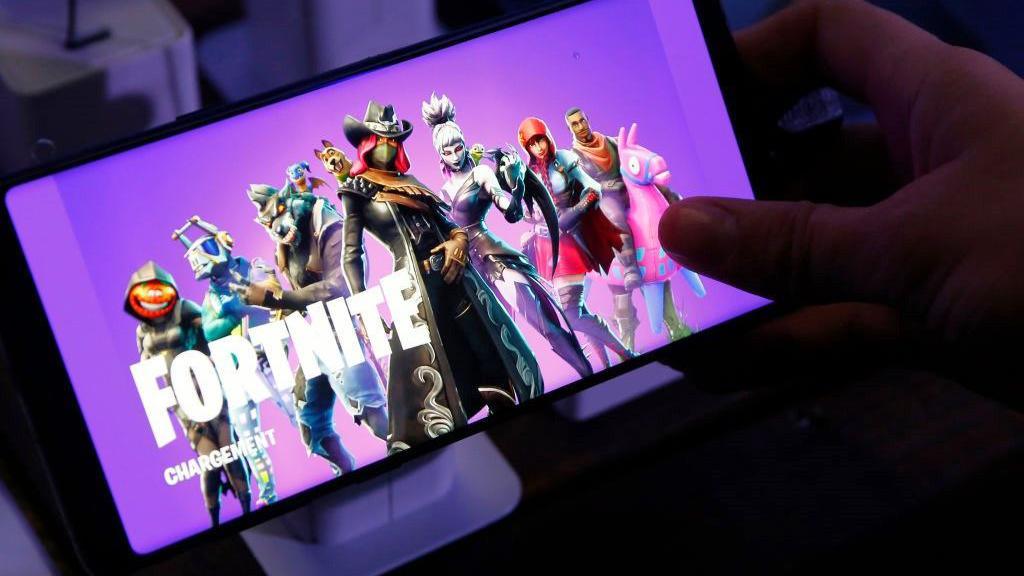Samsung accused of obstructing Fortnite downloads

- Published
Epic Games has accused Samsung of making it too difficult to download its massively popular video game Fortnite on certain mobile devices.
In a legal complaint it said it would file on Monday, it says people have to go through 21 steps before they can play the game on a new Samsung product, including viewing security warning screens and changing settings.
Epic claims this means 50% of people who try to install the game on these devices give up before they complete the process.
Samsung said it would "vigorously contest" the "baseless claims".
According to Epic, the process takes 12 steps, rather than 21, for other Android phones and tablets.
The firm has blamed a Samsung feature called Auto Blocker for the issue, which is turned on by default on the manufacturer's latest products.
The tool is intended to block "malicious activity" and prevent app installations from unauthorised sources.
Epic claims Auto Blocker is affecting Fortnite downloads, and says that goes against competition laws.
Samsung has denied the allegations and says users can disable Auto Blocker if they choose.
"Contrary to Epic Game's assertions, Samsung actively fosters market competition, enhances consumer choice, and conducts its operations fairly," it said.
"The features integrated into our devices are designed in accordance with Samsung’s core principles of security, privacy, and user control, and we remain fully committed to safeguarding users' personal data."
Apps on Samsung or Google’s stores can be downloaded in just a couple of clicks, as the firms have already approved them.
But Fortnite must be downloaded from Epic's own store – which triggers Samsung’s Auto Blocker feature to kick in with warnings about it.
Epic claims both Google and Samsung know Fortnite is a legitimate app, and so there should not be any warnings flagged.
That’s because it used to be available on Google Play – the official app store for Android-powered phones - and Samsung has even previously collaborated with it, running Fortnite competitions and creating digital skins for the game’s characters.
“Epic’s latest lawsuit is a meritless and dangerous move," said Google engineering VP Dave Kleidermacher in a statement, external.
He said Google did not ask Samsung to create their Auto Blocker feature, and Android device manufacturers could design their own additional safety tools.
"While Android allows sideloading, Google and the security community have warned users for years about the real risks associated with downloading apps directly from the web," he said.
He added that governments had also demanded additional safeguards for users, saying these and the "real risks" around downloading web apps were why Google offers safety tools that check for potentially harmful apps.
"To make this about access to a game is deliberately misleading; this is about user safety," he said.
"And Epic's lawsuit puts their corporate interests above user protections.”
'A truly level playing field'
Fortnite's developer has previously taken Google and Apple to court over disagreements about the way the tech firms operate their app stores.
The game returned to EU-registered iPhones in August after Apple was ordered to open up its app marketplace, but it still can't be played on iOS in the UK.
Epic boss Tim Sweeney said he was “very sad” to be initiating more legal action.
"The fight against Samsung… is new, and it really sucks," he said.
"I did not think we would end up in this place."
He claimed Epic would have "made a lot more money" had it chosen not to pursue its previous legal action, but said he wanted to create a "truly level playing field" for developers.
The game developer says it wants Samsung to introduce a process by which all legitimate third-party app developers can apply to be whitelisted from Auto Blocker but is has been unable to reach an agreement.
Fortnite was removed from Apple and Google's app stores in 2020 after Epic introduced its own in-app payments system.
And the developer won a lengthy court battle against Google over app store dominance in December 2023, with a jury deciding that Google had been operating a monopoly.
- Published16 August
- Published7 August